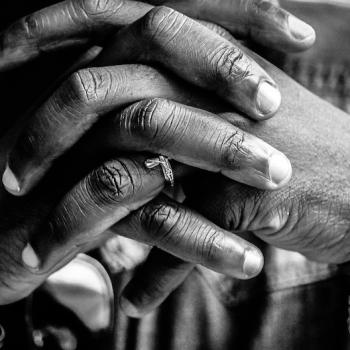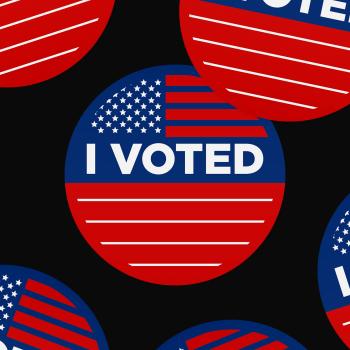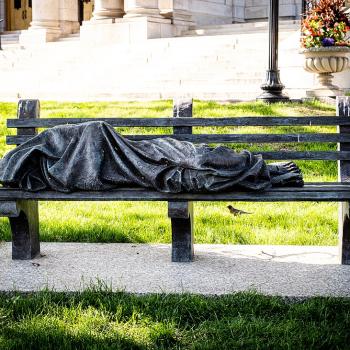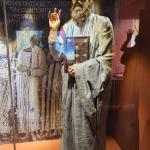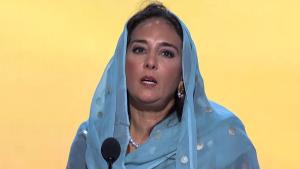
The first freedom guaranteed in the Bill of Rights is the freedom of religion. The First Amendment in the U.S. Constitution protects citizens from government establishments of religion. The government cannot coerce people to follow certain religious ideals. It cannot privilege one religion or sect above others.
The First Amendment also protects Americans’ right to freely exercise their religion. Contrary to what many antagonists of religion may say, religion is not a purely private matter. Americans can practice their religion at home and in public.
Religious liberty was an absolutely revolutionary right which American enshrined in its Constitution. In pre-Enlightenment Europe, European lands were scarred by countless religious wars between Christians of different sects and traditions. Classical liberalism developed to create societies free from this kind of religious violence. As Charles Siegel writes in his book, Classical Liberalism, the liberal tradition was based on “freedom of thought and self-government in classical Athens and freedom of conscience among the radical Protestant sects” (7).
Freedom of thought and freedom of conscience are intimately tied to the violence that sparked over religious disagreements in Christian Europe. And these freedoms are also the founts from which the First Amendment freedoms of religion, speech, assembly, petition, and press flow.
Those who think about politics and religion know just how scary of a mix those two things can be. Religion can become incredibly divisive. So a country in which one is at liberty to choose and practice one’s religion, rather than being forced by the state or persecuted as a minority is one worth safeguarding.
So why did a Sikh prayer at the Republican National Convention spark so much Christian outrage?
Harmeet Dhillon’s Prayer at the RNC
Harmeet Dhillon gave a benediction for the Republican National Convention (RNC). Dhillon is a lawyer and National Committeewoman of the Republican National Committee for California. She is heavily involved in party affairs and well-accomplished in her legal practice.
Before praying, she referenced the July 13 assassination attempt on Trump. Covering up her head, she offered up an Ardas prayer, made by Sikhs before going on a new venture. She sings the Ardas in Punjabi. The camera shows attendees bowing their heads in respect.
After the Ardas, Dhillon prays to Waheguru, the God in Sikh religion. She thanks Waheguru (who is genderless for Sikhs) for creating America and making it a country in which people can practice whatever faith they wish. She prays for the electoral process, wisdom for American voters, and prays over Trump. Her prayer is not much different than evangelical pastors who pray to the Christian God over Trump.
She closes,
May your name forever be exalted, spreading happiness and blessings and good spirit. That everyone may prosper and enjoy the grace of your peace.
Christian Outrage over a Sikh Prayer
Many Christian content creators took to social media to put Dhillon’s prayer on blast. Accusations ranged everywhere from purely religious intolerance, to ethnic and racial intolerance.
Michael Moore (@honestyouthpastor on Instagram) posted a reel that currently has over 290,000 views. In the post, he says,
The Republican Party welcomes prayers offered to demons now. While this isn’t surprising[, w]hat is surprising is that, as far as the cameras showed, not a single person that claimed Christ in the audience said or did anything.
Another account (@tallhandsomepatriot, also on Instagram) also posted a reel expressing disgust over the benediction. This reel at the time of writing is nearing 160,000 views. The caption reads,
No, “wanan[****]guru” is not the “one true god”, only Christ is. Get out of here with this blasphemous bs. Only those who truly put Christ first can be trusted to save this country.
The comment sections under both of those posts are interesting, to say the least. But the point of this article is not to sulk over two random reels posted on the Internet. Rather, it’s to get to the bottom of why the very presence of a brown Sikh woman upset so many Christians.
A Shifting Religious Landscape
For White America, the religious landscape has changed considerably over time. At the beginning, colonizers were largely Anglo-Protestant. Before colonialism, indigenous peoples had their own spiritual traditions which settlers tried to stamp out persistently through assimilative practices.
Black slaves were often Christians. But as Gayraud Wilmore notes in Black Religion and Black Radicalism, they carried their traditional religions and spiritualities with them, and in some cases Islam. There were American Jews, as well as Catholic immigrants, who suffered fierce persecution for being neither English nor Protestant.
In those days, Americans really saw a depth of religious diversity in their country, even though white Americans were nearly all Christian. They largely focused more on their sectarian differences than on their broader religious commonalities.
However, as others began to come in, things changed considerably. No longer were there only Christians of different types. There were now East Asian immigrants who came to build the railroads who brought in Confucianism, Daoism, and Buddhism. There were Southeast Asians who brought Hinduism and Sikhism. African immigrants brought traditional African religious traditions. Orthodox Christians from Eastern Europe immigrated as well.
Today, Christians seem less likely to care about their doctrinal differences with other Christians. Denominationalism between Christians simply isn’t that much of a dividing line anymore. They are more likely to care about their political differences which divides congregations and denominations today. But Christians do notice the differences they have with other religions. Sometimes the very presence of people who belong to a different religion is enough to spark anything from discomfort to outrage.
But this is not the full story of why Dhillon sparked outrage at the RNC. Politically conservative Christians also have a certain relationship of the Republican Party.
Christians and the Republican Party
Since the 70s and 80s, the Republican Party has become a safe haven for predominantly white evangelicals and traditional, Americanized Catholics. While today, abortion is the most common issue that binds conservative Christians to the Republican Party, this was not always the case.
Before Roe, evangelicals were largely apathetic towards the morality or immorality of abortion. Evangelicals had different takes on it. They were not as dogmatic about it as they are today. Catholics were strongly anti-abortion, but this anti-abortion stance meshed into a consistent ethic of life. Before Roe, pro-life Catholics were also against the death penalty, war, and the economic inequities from which abortion arises.
As Brad Onishi writes in Preparing for War, the initial issue which first wedded evangelicals to the Right was segregation. The federal government moved to desegregate public schools, but it could not fully desegregate private ones. Most private schools were Christian schools. And since so many of these Christian schools were against desegregation, the Right provided a convenient political ally to resist “big government” politics.
Today, many Republican Christians continue to see the Republican Party as a political safe haven. Especially when it comes to sexual issues like abortion or LGBTQ+ rights, Christians find a cultural safe space to hold and even enforce their religious values onto others.
Resisting Strange Bedfellows
We now have a sufficient understanding of why many, predominantly white conservative Christians had such dislike for Dhillon’s prayer. American religious history has made possible certain attitudes towards religious minorities. These minorities are seen as undeserving of the privileges that Christianity has enjoyed in America. But what’s worse is that these antagonisms towards religious minorities are undergirded by racial attitudes.
It is no mistake that Vivek Ramaswamy and Harmeet Dhillon, two non-white non-Christian Republicans, have been publicly rejected by their conservative allies. When Ann Coulter interviewed Ramaswamy on her show, she remarked on how “articulate” Ramaswamy was, and how she agreed with him on many points. But nevertheless, Coulter said, “I still would not have voted for you because you’re an Indian.”
And now, when Dhillon shares her Sikh faith at the RNC, Christians attack her for not praying to the right God, even though the RNC is a secular event, not a church service.
It has often been said that politics makes strange bedfellows. Politics brings together people that you wouldn’t think would ever work together. At the Jericho March in 2020, for example, Jews, evangelicals, and Catholics all marched around in Washington DC to guarantee that Trump would win the election.
But there are Christians who want to resist even these political allies. They don’t want allies who aren’t like themselves. They want to be the sole saviors of America, and distrust people of other faiths so much that they want to see them de-platformed.
Towards a Better Theology of Religious Plurality
Hopefully, this topic will be fleshed out in later articles. But for now, I wish to put forward the need for a better theology of religious plurality.
I do not mean a theology of universalism. Universalism often means an unconditional soteriology: all go to heaven, no matter what religion they practice. I believe that this sort of simplistic universalism is incompatible with the Christian tradition.
But, at the same time, the simplistic type of exclusivism that renders all other gods demonic is inadequate and unbiblical. There is so much that the Bible has to say about other gods and spirits that does not match the ironically pagan categories that we use to talk about the spiritual world. And this biblical material gets ignored when we think about other religions through the lens of biblical theology.
It strikes me as strange that so many American Christians have such a hard time doing life with people who do not share their convictions. As suggested here, it seems that the difficulty comes from a certain comfort with being the norm. For most of American history, it has been “normal” to be white, and “normal” to be Christian. It also comes from entitled expectations of being the privileged religion in the Republican Party. But times are changing.
Christians are becoming confronted with the fact that theirs is not the only religion in the world. And whereas in previous decades, Christians would be unlikely to encounter people of other traditions, today it is much more common.
A theology of religious plurality, or a theology that helps us to live life alongside neighbors who believe and practice differently than we do, is needed. What does the exclusivity of Christ imply for our lives with our civic neighbors? Does it require us to demean and demonize them and their faith? Or are there ways for us to bear witness in other, more biblical ways?
Thankfully, there is guidance for these questions in the Bible. But that is for another time.





